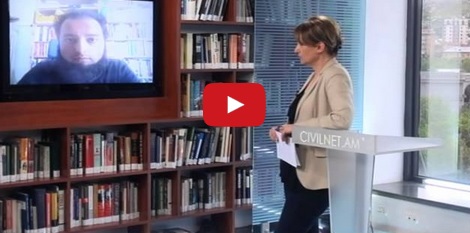As a part of CivilNet’s programming marking the Armenian Genocide centennial, dozens of interviews are being conducted with artists, academics, writers and intellectuals from Armenia, Turkey and around the world, to give a broader perspective on various issues related to the Armenian Genocide.
Historian and genocide scholar Ugur Umit Ungor has written extensively about genocide, mass violence and memory. He spoke to CivilNet about the changes taking place in Turkish society, what constitutes memory and the centennial of the Armenian Genocide.
According to Ungor, the centennial itself doesn’t mean there will be a change and shift in policy. The policy of denial would only change when there is a significant political change, either because of a revolution or a brave new politician. It is not because of time passing, because time does not necessarily heal wounds and it could even get worse. Denial builds up frustration over generations, says Ungor.
“Despite recent developments, we have to acknowledge that this Turkish government has done quite a bit about opening up public debate, about the genocide and making possible a certain freedom of speech and freedom of publication, which was absolutely impossible in the 80s and 90s. In the past few years, we have come quite a long way, but at the same time it demonstrates where are the limits of this opening,” says Ungor.
“One of those limits that I’d like to mention is the confiscated properties. The Armenian properties that were stolen during and after the genocide was so incredibly enormous that any public discussion about it would unleash a call for restitution and compensation. That debate is not possible yet in Turkey.”
Ungor states that the recognition of the Armenian Genocide is still limited among liberal and intellectual circles in Istanbul. “They are quite multicultural and they think that Armenians were part of the Ottoman Turkish society. But if we travel in major cities in eastern Turkey, such as Erzurum, Kars, Van, etc, I don’t think that the levels of recognition are very high yet. We need to fight for recognition as well and we need to do that through public debate and of course education.”
Recognition is a psychological process, says Ungor. “You have to accept that your nation has committed very severe crimes, including genocide, against another nation. The moment compensation and restitution comes into the picture you actually have to give something up. So you might have to give a part of your business because it was based on a confiscated property. You must have to give up some land, in case of the Turkish army and Turkish state properties, and maybe with reparations, even with interests.” There is a quite a long way to go, Ungor thinks and continues, “I think it is a much more serious problem, because people will have to face material concessions. I even know people who recognize the Armenian Genocide in Turkey and they express how terrible it is, but they are not ready to give up the properties stolen as a result of the genocide. So these are the limits we hit when we talk about recognition and reparations.”
















